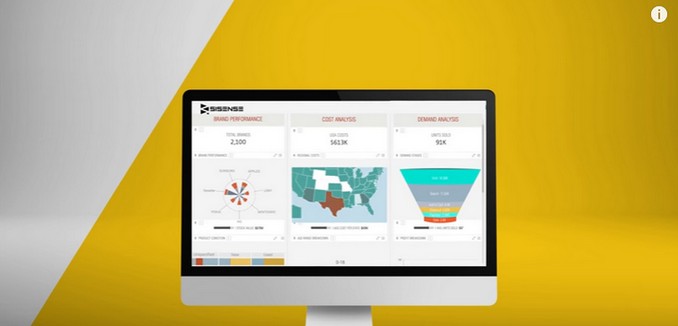Amir Orad is a big-data technology thought leader and go-to guy for reporters from Forbes, Bloomberg Business Week, The Washington Post and USA Today seeking perspectives on how companies are meeting the demand for data analysis.
It’s well known that New York City is securing its position as a data-driven powerhouse, but less well known that Israeli startups in the Big Apple – like Orad’s Sisense, among many others – are leading the development of this ecosystem, according to ICONYC Labs cofounder and partner Eyal Bino.
“I see more Israeli companies than their relative share in these areas,” Orad tells ISRAEL21c at Sisense headquarters in Tel Aviv. “All of the Israeli companies in data have one thing in common: they took very advanced technologies, lots of data analytics, into focused sites – whether to help businesses, doctors, banks… this and that. The Israelis are really good at taking hardcore science and a pragmatic approach to getting results quickly.”
“The entire ecosystem of data is strong in the Israeli tech scene,” says Pini Yakuel, founder and CEO of Optimove, founded in 2009 and now helping more than 250 brands grow through their existing customers with predictive technologies.
“But Israel is a small country. So, in order to build a business and expand, you need to go outside and the US is known as the biggest IT market on the planet.”
Yakuel, 39, moved his family from Israel to the US last year as his Tel Aviv-based company opened a New York City office.
“New York is a good place for an Israeli tech startup,” he says. “There is a good feeling here about Israeli tech. I don’t think there was a specific plan that Israeli companies said ‘Let’s design the data ecosystem of New York.’ But rather it just happens because there are a lot of data companies in Israel, a lot of them come to New York.”
The ability to interpret big data and find the needle in the haystack of information to help in decision-making is crucial.
Orad says the military’s elite intelligence unit, 8200, and others, produce a lot of graduates good at mining data for valuable nuggets. “Data is a natural resource. Data by itself is like bricks. It’s all about what you do with it.”
Other examples of Israeli companies disrupting the data-analytics and big-data sphere in New York are Taykey, a real-time audience data company; NICE Actimize, using data for financial-crime prevention; Signals Group data analytics for product development; Zebra Medical Vision deep-learning platform for medical imaging; Via analytics to solve transportation problems; and Taboola and Outbrain content-discovery platforms.
“In the world of decision-making our technology challenges the traditional consulting approach,” says Gil Sadeh, CEO and founder of Signals Group, about his company’s platform based on military intelligence methods to analyze external data, connect faint signals and provide valuable insights for new product development.
IoT is often considered the most data-dependent field. But Orad, of Sisense, says that in today’s digital world there’s no such thing as a sector that is not data-dependent.
“Today, every business, hotel chain, government agency, tech company, education agency… all of them understand the potential of data,” Orad tells ISRAEL21c. “If you watch Netflix, they know what you’ll want to watch next before you do. If you buy from Amazon, they ship the product to your house before you buy it. If you take an online class, they suggest the next class you’ll want to take.”
Orad says the view of big data has changed in the last few years. “Now analytics is definitely the focus area. Give me data, I’ll give you value.”
Optimove’s Yakuel tells ISRAEL21c that the value comes from smarter methods to digest and make sense of data, synthesize it and provide it context.
A Gartner report tapped 2017 as the year “data and analytics will drive modern business operations, and not simply reflect their performance. … Executives will make data and analytics part of the business strategy, which will allow data and analytics professionals to assume new roles and create business growth.”
“The revolution has been going on for a few years, but it takes time for the market to realize that it’s a revolution and for businesses to understand the importance,” Orad tells ISRAEL21c. “The fact that you can do something doesn’t mean that someone wants you to do it.”
In fact, when Sisense was founded in 2010, its founders “had a totally different way of doing things that was defined as stupid by every professional on the planet, to the point that no one invested in them,” says Orad. “It was not stupid; it just took five years to prove that every single way people approached analytics and BI before can be disrupted.”
Today, says Yakuel, “Businesses definitely welcome us and want to talk about what we do. There’s a greater level of sophistication within the companies we talk to, and the market is better educated about how to buy data analytics products and use them.”
From cybersecurity to advertising, health to education, fintech and beyond, Orad predicts Israeli companies in New York will continue making a mark in the data-analytics arena.
“New York-based Israeli companies that use analytics on big data [have] substantially changed the market,” he says. “There’s no arena that won’t be affected. All companies will use analytics or die.”
(via Israel21c)
[Photo: Sisense / YouTube ]




